Police Win Braking Case on Appeal
Page 18

If you've noticed an error in this article please click here to report it so we can fix it.
LAST week, Chief Inspector Hobson, La of the Stoke-on-Trent police, successfully appealed before a King's Bench Divisional Court from a decision of local magistrates dismissing informations against Mr. William Wilson, X.R.P. mobile-canteen van driver, and Mr. James Wallace Anderson, ambulance transport officer, of Stoke, charging 'alleged offences under the Motor Vehicles (Construction and Use Order.
The facts were that Mr. Anderson stated, in evidence, that the brakes of the canteen van were tested and he was satisfied that they were in good condition on the morning of January 28, 1941. Later in the day, when Mr. Wilson was driving the vehicle, he approached a stationary bus and his brakes failed adequately to act, with the result that a collision occurred. The cause of the defect in the braking system was discovered to be due to the snapping of a pull rod from a latent defect in the metal.
Mr. Wilson was summoned for driving the vehicle when its braking systet; was not maintained in an efficient con dition, and Mr. An'derson with permitting the vehicle so to be used.
Mr. A. Sellers, K.C. for Inspector Hobson, submitted tliat the magistrates were wrong because the mere fact that a rod snapped before the accident—and not during the accident— did not protect the defendants from a condition which was imperative that the brakes should be maintained in efficient order. The regulation demanded that there should be two independent and efficient braking systems.
Mr. A. T. Denning, KC., for the respondents, stated that up to the time of the accident inspection had revealed no latent defect in the rod and apparently the brakes were efficient. The law did not expect a person to do the impossible and discover a defect which only metal fatigue or some such cause would reveal.
The Lord Chief Justice remarked that whatever happened to the foot brake the magistrates had also found that the hand brake did not operate after the former failed. From that it could be inferred that the hand brake was not efficient.
The case showed that if vehicle users realized their great responsibilities and complied strictly with the regulations, road accidents might be fewer. The appeal would be allowed.




















































